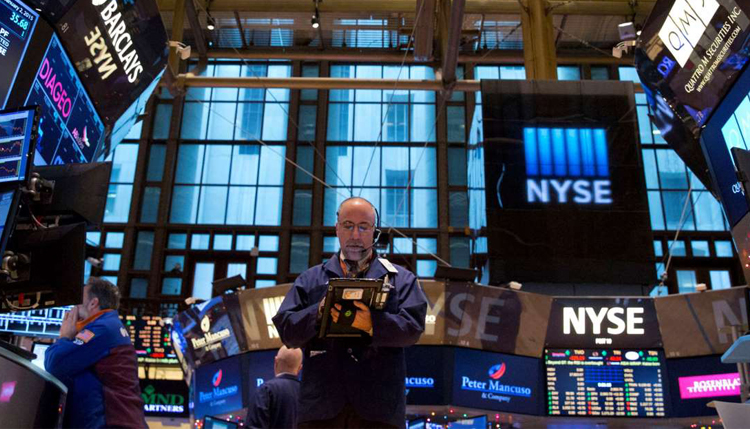U.S. stocks fell on Wednesday as shares of Apple rolled over and dipped briefly into a bear market before recovering. A decline in bank shares also pressured the broader market. The S&P 500 closed down 0.8 percent, clinching its fifth straight day of losses.
It’s now in the red for the month of November following October’s 7 percent rout. The Dow Jones Industrial Average finished 206 points lower on Wednesday. The Dow fell more than 400 points from its highs of the day. The Nasdaq Composite pulled back 0.9 percent.
Apple fell 2.8 percent and briefly traded 20 percent below its all-time high, dipping into a bear market. The decline comes after Guggenheim downgraded the stock and UBS cut its iPhone estimates. Investors have been worried the company’s iPhone sales will slow down in the near future.
The stock had traded higher earlier on Wednesday and closed 19.9 percent from its record high reached earlier this year.
The SPDR S&P Bank ETF (KBE) fell 1.9 percent, erasing earlier gains, after Democratic Rep. Maxine Waters said the Trump administration’s efforts to curb banking regulations “will come to an end.” Goldman Sachs, J.P. Morgan Chase and Citigroup all traded lower. Waters is expected to take over as chair of the House Financial Services Committee.
“I believe the stock market is experiencing is a continuation of the selling pressure that began in early October,” said Robert Pavlik, chief investment strategist at SlateStone Wealth. “If investors don’t understand what was behind the selling or what started it then there is hesitation to buy and with continued pressure it leads to an unwillingness to hold stocks especially as the volatility and selling pressure continues.”
Market sentiment was also hurt by comments from Rep. Bill Pascrell, D-NJ. In an interview with Bloomberg News, Pascrell said the updated trade deal between the U.S., Canada and Mexico needs to be changed before it can pass through Congress.
There needs “to be not only changes in the legislation but more enforcement,” said Pascrell, who is in line to be the head of the House Ways and Means subcommittee on trade.
Equities rose earlier in the day as oil climbed 1 percent to rebound from a 7 percent plunge in the previous session, calming traders worried about the collapsing market. Crude posted a gain for the first time in 13 sessions on Wednesday. Prices have been under pressure recently amid fears of an abundance of supply and not enough demand.
President Donald Trump earlier this week sent another warning to producer cartel OPEC (Organisation of Petroleum Exporting Countries), saying he hoped the group would not cut output in a move to buoy prices. The fall in crude has also sparked worries of a global economic slowdown.
“The crude crash has gotten extreme,” said Frank Cappelleri, executive director at Instinet. “While a mean reverting move is expected soon, the downturn has had negative effects on both the high yield bond market and credit spreads — all of which will be influential on any rally attempts for equities.”
Wednesday’s moves come after a volatile session on Tuesday, with the Dow falling just a touch above 100 points by the close, despite a rise earlier in the session in excess of 100 points.
Reports of renewed trade talks between the U.S. and China failed to lift sentiment on Wednesday, with traders keeping a wary eye on volatility in the oil market.
A slew of Federal Reserve speeches are expected on Wednesday. At 6 p.m. ET, Federal Reserve Chairman Jerome Powell and Dallas Federal Reserve Bank President Robert Kaplan will be speaking on global economic issues in Texas.
Source: CNBC


